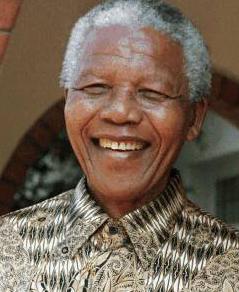Mandela’s Dream of Black Power Became a “Neoliberal Nightmare”

Tributes to Nelson Mandela fill the media, with stories of his lengthy prison term and his “willingness to forgive” his oppressors.
Nowhere in sight is the real story of Nelson Mandela and the African National Congress that he headed, a story best told by Naomi Klein in her wonderful book, The Shock Doctrine.
The ANC’s Freedom Charter, adopted in June 26, 1955, in Kliptown South Africa, begins with the promise,
“The People Shall Govern…”
It promises Land to the landless. Equality. Free and compulsory education. Freedom of movement, and more.
From prison, Mandela wrote a note to his supporters in January of 1990, a month before his release. Here’s what he wrote:
“The nationalisation of the mines, banks and monopoly industries is the policy of the ANC, and the change or modification of our views in this regard is inconceivable. Black economic empowerment is a goal we fully support and encourage, but in our situation state control of certain sectors of the economy is unavoidable.”
In the 1980s, young Black South Africans, weary from three decades of patience, took to the streets to fight for their beloved Freedom Charter.
When Mandela was released from prison after 27 years, on February 11, 1990, most spent on Robben Island off the coast of Cape Town, South Africa under the ANC appeared ripe to fulfill their dream: the Freedom Charter.
Great Expectations: yet, South Africa took the route characterized by Mandela as “inconceivable.” Political successes, but economic ruin. South Africa is now among the most unequal societies in the world.
World attention focused on the high profile political talks between the ANC’s Mandela and F.W. de Klerk, leader of the National Party. The ANC was determined to win this political fight, and did. de Klerk had the guns and the money, but Mandela had millions of people with him.
The lower profile economic negotiations under the ANC’s Thabo Mbeki, were disastrous.
Mandela’s government fell victim to a process pioneered in Chile before the government was taken over by the democratically elected Salvador Allende: democracy-proofing capitalism.
Key sectors of economic decision making such as trade policy and the role of the central bank were portrayed by the de Klerk government as “technical” or “administrative.”
Control of these power centres was handed to supposedly “impartial experts” such as officials from the IMF and the World Bank… in a “balkanization” strategy. A Constitutional clause protecting all private property made land reform virtually impossible.
Instituting currency controls to prevent wild speculation would violate an $850 million IMF deal which also promoted “wage restraint,” which prevented raising minimum wages.
The South African Central Bank was privatized, and run by the same man who had run it under apartheid. Derek Keyes, the white finance minister under apartheid, retained his post.
There was no betrayal by Mandela’s ANC negotiators: they were simply outmanoeuvred. de Klerk and the whites had the international financial control necessary to leverage their way. When Mandela was released from prison, the South African rand dropped by 10 percent and the stock market collapsed in panic. Whenever a party official hinted that the Freedom Charter would become policy, the rand went into free fall. In a single month in 1996, the rand plummeted 20 percent.
Klein quotes Yasmin Sooka, a prominent South African human rights activist.
“[Business said] We’ll keep everything and you [the ANC] will rule in name…You can have political power, you can have the façade of governing, but the real governance will take place somewhere else.”
So, despite the ANC revolution headed by Nelson Mandela, the economy, the land and the “banks, mines and monopoly industry” that Mandela pledged to nationalize remain firmly in the hands of Whites who are just ten percent of the population.
In a quote you will seldom read elsewhere, Klein cites Mandela, who told the ANC’s national conference in 1997 that the globalization of capital, “makes it impossible for countries…to decide national economic policy…”
With its wrists handcuffed, Mandela’s ANC opted for neo-liberal shock therapy of more privatization, cutbacks to government spending, looser controls on money flows, fewer labour laws, and selling off state-owned firms to service a horrendous debt owed to the oppressors.
The only way out of this mess for South Africa today is to follow the lead of Venezuela’s former president Hugo Chavez: introduce a new constitution. Pay off the IMF debts, and follow the South American nations which have gained economic independence. Then, you can institute the Freedom Charter.
Dr. James Winter is Professor of Communication, Media & Film, University of Windsor, Ontario Canada. He is the author of the following books: Lies The Media Tell Us, 2007; MediaThink, 2002; Democracy’s Oxygen, 1997; The Big Black Book (with Maude Barlow) 1997; Common Cents, 1992; along with other edited books, chapters and articles. He has published with: Stoddart Publishing, Toronto, the University of Ottawa Press, Black Rose Books Montreal, and Ablex N.Y. [email protected]

